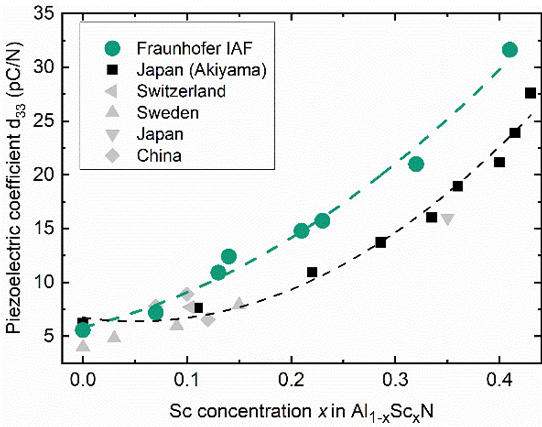News: Microelectronics
20 March 2020
PiTrans project results in AlScN-based SAW resonators for smartphones
The ever-growing mobile data transfers in the wake of 5G require the use of more and higher frequency ranges, all of which need to be accommodated within a single mobile device. The demands on radio frequency (RF) components are hence constantly increasing. The Fraunhofer Institute for Applied Solid State Physics IAF of Freiburg, Germany has developed novel, compact and energy-efficient high-frequency/high-bandwidth RF filters to meet those needs (‘Enhanced electromechanical coupling in SAW resonators based on sputtered non-polar Al0.77Sc0.23N (112-0)112-0 thin films’, Appl. Phys. Lett. 116, 101903 (2020)). During the project ‘PiTrans – AlScN − Development of novel piezoelectric materials’ (running from 2015 to 2020) the researchers managed to grow aluminum scandium nitride (AlScN) with the required industrial specifications and to realize novel electroacoustic devices for smartphones.
The amount of RF components built into a single smartphone has increased significantly over the past years and there is no end in sight. Predicting this trend in 2015, the PiTrans project set out to develop and produce improved RF piezo-transducers with ternary AlN-based nitrides as the piezo-active layer. Within the five years of the project, the researchers succeeded in growing highly crystalline AlScN layers and realizing surface acoustic wave (SAW) resonators that meet the increasing requirements of the industry.
For growth of the material, which is also promising for other power electronic applications, a modern magnetron-sputtering infrastructure was established at Fraunhofer IAF. The project was funded by a ‘Fraunhofer Attract’ excellence stipend program and was successfully completed in January under the leadership of Dr Agnė Žukauskaitė.
Potential and challenges of AlScN
AlScN remains the most promising new material to replace conventional aluminum nitride (AlN) in RF filter applications inside mobile phones. By introducing scandium (Sc) into AlN, the electromechanical coupling and piezoelectric coefficient of the material is increased, enabling a more efficient mechanical-to-electric energy conversion. This allows the production of much more efficient RF devices. However, the instability of the piezoelectric AlScN crystal phase has so far been a problem for industrial use of the material, as segregation of wurtzite-type AlN and cubic ScN usually occurs during growth. “Back in 2015, we knew the potential of AlScN, but we needed to find the right conditions to grow it in a stable and scalable process,” recalls Žukauskaitė.
Successful growth and device development
In the course of the project, the researchers at Fraunhofer IAF managed to grow highly crystalline AlScN layers with a wide range of compositions up to a Sc content of 41%. Good homogeneity of the layers was achieved across the entire silicon wafer up to 200mm in diameter, which meets the requirements of industrial productions. Besides these industry-relevant results, the project team also succeeded in realizing epitaxial growth on lattice-matched sapphire (Al2O3) substrates through a special magnetron sputter epitaxy (MSE) method of deposition, which will be useful for future material research.

Picture: Piezoelectric properties of AlScN layers produced at IAF compared with results of other research institutes. © Fraunhofer IAF
In addition to the material development, the researchers produced three generations of test structures to demonstrate the performance of the AlScN thin films. The implementation of MSE to produce AlScN/Al2O3-based resonators yielded an electromechanical coupling increase of up to 10% at 2GHz frequency. In a collaboration with the companies Evatec and Qualcomm, a non-polar AlScN thin film was also developed that further improves the electromechanical coupling of SAW resonators. This technology is currently being further researched, and first results have recently been published in a scientific paper.
AlScN for other applications
“We see AlScN as a very promising candidate for enabling future applications that capitalize on the piezoelectric effect, such as sensor technologies and high-electron-mobility transistors [HEMTs],” says Žukauskaitė. The success of the PiTrans project led to the acquisition of two further projects involving AlScN technology at Fraunhofer IAF. In the project mAgnes, wide-bandgap current sensors (such as those used in e-cars) are being researched; and in the project SALSA the research team is developing new types of switchable HEMTs. Both projects benefit from the developed expertise in AlScN growth and AlScN-based device development as well as the necessary infrastructure established at Fraunhofer IAF.
Fraunhofer IAF claims first MOCVD production of AlScN layers for transistors
Aluminium scandium nitride exhibits ferroelectric behavior









